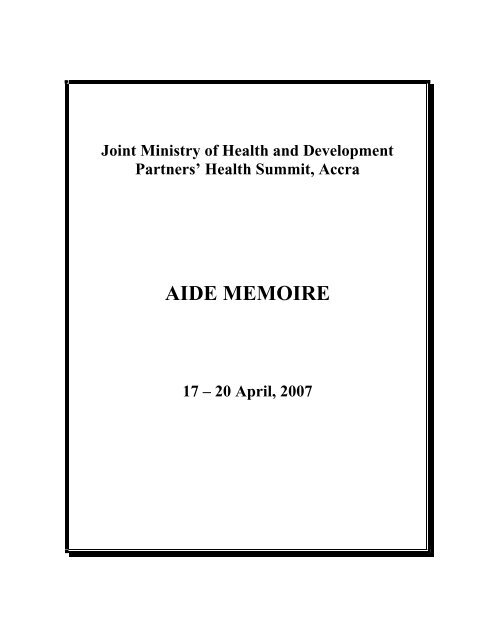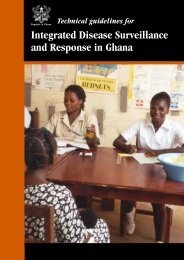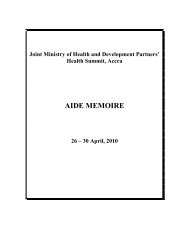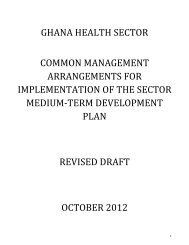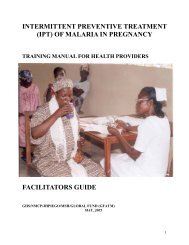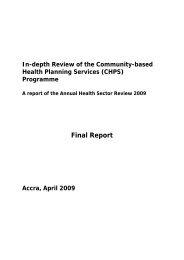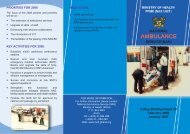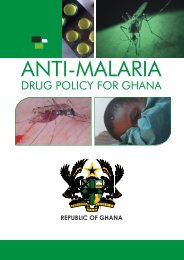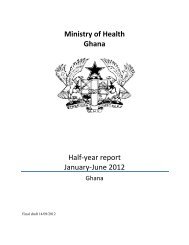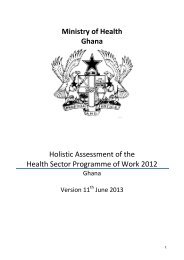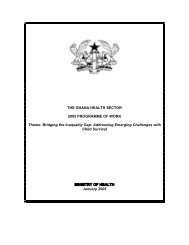Aide Memoire April 2007 - Ministry of Health
Aide Memoire April 2007 - Ministry of Health
Aide Memoire April 2007 - Ministry of Health
Create successful ePaper yourself
Turn your PDF publications into a flip-book with our unique Google optimized e-Paper software.
Joint <strong>Ministry</strong> <strong>of</strong> <strong>Health</strong> and Development<br />
Partners’ <strong>Health</strong> Summit, Accra<br />
AIDE MEMOIRE<br />
17 – 20 <strong>April</strong>, <strong>2007</strong>
PREAMBLE<br />
Joint <strong>Ministry</strong> <strong>of</strong> <strong>Health</strong> –Development Partners’ Summit<br />
Executive Hostel Conference Centre, GIMPA Accra,<br />
17 th - 20 th <strong>April</strong> <strong>2007</strong><br />
<strong>Aide</strong> Memoir<br />
The <strong>2007</strong> <strong>Health</strong> Summit was held from the 17 th to the 20 th <strong>of</strong> <strong>April</strong> <strong>2007</strong> at the Ghana<br />
Institute <strong>of</strong> Management and Public Administration. The opening ceremony was chaired<br />
by Mrs. Mary Chinery-Hesse, Chief Advisor to his Excellency the President <strong>of</strong> the<br />
Republic <strong>of</strong> Ghana. She congratulated the <strong>Ministry</strong> <strong>of</strong> <strong>Health</strong> (MOH) and Development<br />
Partners (DPs) for coming together to review performance and to chart the way forward.<br />
She stressed the need for information sharing as critical to the partnership and the need<br />
for the health sector to maintain industrial harmony to enhance performance.<br />
The DPs congratulated the MOH on the new vision with a choice for wider focus on<br />
disease prevention and health promotion rather than focusing on medical oriented care by<br />
qualified health personnel only. DPs reiterated the fact that good quality institutional care<br />
needs to be complemented by healthy lifestyles in many other areas such as environment,<br />
nutrition, reproductive health, water and sanitation among others. The year 2006<br />
presented a picture <strong>of</strong> mixed performance. DPs, however, welcomed the real<br />
improvement in the field <strong>of</strong> nutrition and its potential to improve child survival. The<br />
challenge for maintaining the pro-poor focus <strong>of</strong> the National <strong>Health</strong> Insurance Scheme<br />
(NHIS) and the need to ensure that the shift from basket funding to budget support does<br />
not result in less total funding to the sector were raised as major concerns.<br />
In his address, the Hon. Minister <strong>of</strong> <strong>Health</strong> reminded the meeting <strong>of</strong> the continuing<br />
burden <strong>of</strong> diseases dominated by preventable, easily treatable and persistent childhood<br />
communicable diseases. He also mentioned the increasing levels <strong>of</strong> non-communicable<br />
diseases mainly associated with lifestyle and poor eating habits <strong>of</strong> Ghanaians and called<br />
for support for the health sector’s drive for life style changes and the adoption <strong>of</strong><br />
healthier habits by individuals, families and communities. He requested DPs to reflect on<br />
their support and begin to make the Paris Declaration a reality in the health sector. He<br />
called on DPs to respond and not to prescribe, and commit to the long term health<br />
development.<br />
The findings <strong>of</strong> the draft Independent Review <strong>of</strong> Programme <strong>of</strong> Work 2006 (POW 2006)<br />
were presented and discussed. The review has focussed on progress towards the health<br />
related MDGs. No additional in-depth reviews were undertaken. The financial section <strong>of</strong><br />
the draft review report is based on preliminary data.<br />
This aide memoir reflects the conclusions and consensus reached at the business meeting<br />
between the MOH and DPs and outlines key steps to be taken in the short to medium<br />
term to improve performance <strong>of</strong> the health sector. It also reflects the collective<br />
responsibility <strong>of</strong> government and Development Partners in the health sector for ensuring
the availability <strong>of</strong> agreed resources for implementation and for monitoring and evaluation<br />
<strong>of</strong> the programme <strong>of</strong> work.<br />
HEALTHY LIFESTYLES AND ENVIRONMENT<br />
The meeting agreed that the regenerative health programme as presented at the summit<br />
was a more comprehensive programme that goes beyond the control <strong>of</strong> non<br />
communicable diseases. It also noted the need for a more comprehensive social and<br />
behavioral change and requests the MOH to examine the capacity <strong>of</strong> the health promotion<br />
unit in the scheme <strong>of</strong> things.<br />
The meeting discussed the role <strong>of</strong> other sectors, particularly the <strong>Ministry</strong> <strong>of</strong> Education,<br />
since behavioral changes best approached from the formative years. It was agreed that the<br />
role <strong>of</strong> the National <strong>Health</strong> Insurance Fund (NHIF) should be more defined since it is in<br />
the interest <strong>of</strong> the Fund to support health promotion. The MOH will explore the<br />
possibility <strong>of</strong> earmarking a percentage <strong>of</strong> the NHIF for health promotion, while paying<br />
attention to issues <strong>of</strong> sustainability <strong>of</strong> the NHIS. In addition the MOH is considering the<br />
creation <strong>of</strong> a special fund to deal with financing <strong>of</strong> unexpected epidemics, incidental<br />
payments for assistance, to cater for delayed disbursements <strong>of</strong> funds and even the<br />
possibility to use it for the construction <strong>of</strong> CHPS compounds.<br />
SCALING UP OF SERVICES<br />
The meeting recognized the urgent need to address the high maternal, infant and underfive<br />
mortality, and taking cognizance <strong>of</strong> the results <strong>of</strong> the bottleneck analysis in costing<br />
the 5-Year PPOW (MBB), as well as the need to scale up priority cost-effective<br />
interventions under the High Impact, Rapid Delivery (HIRD) strategy, made the<br />
following recommendations:<br />
• Accelerate the planning and resource allocation process such that implementation <strong>of</strong><br />
HIRD activities can be expanded to the remaining six regions <strong>of</strong> the country.<br />
Specifically plans will be available for all regions by September <strong>2007</strong> and scale up<br />
will depend on resource availability, while taking steps to build on the foundations<br />
laid in the four original regions<br />
• Align the HIRD planning and budgeting process with district-level MTEF processes<br />
for 2008. Consequently district-level HIRD plans and budgets for 2008 will be<br />
developed in May/June <strong>2007</strong> in order to feed into district MTEF<br />
• Initiate steps to improve upon the supervision, monitoring and evaluation components<br />
<strong>of</strong> the HIRD by using the established HIRD monitoring framework.<br />
• Plan for an integrated “Maternal and Child <strong>Health</strong> Campaign” late in <strong>2007</strong>, to<br />
provide ITNs to all pregnant women and infants (under one year, i.e. those infants<br />
born subsequent to the Nov/06 campaign); vitamin A supplements; de-worming; birth<br />
registration; (plus polio if necessary); consider linking to campaign to register all<br />
children in NHIS
• Invest in Basic and Emergency Obstetric Care in a systematic manner after a review<br />
<strong>of</strong> the costed 5-Year Strategic RCH Plan to ensure that it fits into the 5 Year POW<br />
• Undertake a small area variation analysis <strong>of</strong> capacities and performance in all regions<br />
as a basis for improving targeting <strong>of</strong> services to the poor and most vulnerable.<br />
• Develop a comprehensive IEC/BCC and social mobilization strategy to promote<br />
better utilization <strong>of</strong> health services.<br />
• Integrate mental health care more fully into the general health care system,<br />
emphasizing community-based care.<br />
HEALTH SYSTEMS CAPACITY DEVELOPMENT<br />
Strengthening health systems is critical for increasing efficiency and effectiveness in the<br />
execution <strong>of</strong> health promotion activities, disease control programmes, curative and<br />
rehabilitative health programmes as well as in the governance <strong>of</strong> the health sector. This is<br />
especially so in an environment with resource constraints and a demand for more<br />
accountability and results with a focus on the MDG’s.<br />
The meeting agreed that the main areas where strengthening is important in the short to<br />
medium term are human resource management, the development <strong>of</strong> the health<br />
management information systems (HMIS), institutional care, infrastructure development,<br />
and district health systems. The following next steps were agreed on:<br />
Human Resources for <strong>Health</strong><br />
• Complete the strategic plan for human resources for health (HRH) before the end <strong>of</strong><br />
June <strong>2007</strong> to serve as input for the development <strong>of</strong> POW 2008.<br />
• Monitor the impact <strong>of</strong> salary increases (including support staff) on retention,<br />
distribution, motivation and productivity in the health sector.<br />
• Increase the number <strong>of</strong> facilities in which health staff are provided with practical<br />
training and monitor quality <strong>of</strong> graduates <strong>of</strong> expanded training programmes <strong>of</strong> staff<br />
• Start the measurement <strong>of</strong> performance in human resource management using the<br />
proposed indicators in the annual review report (box 14, pp 58)<br />
<strong>Health</strong> Management Information System<br />
• Accelerate development <strong>of</strong> the comprehensive HMIS plan as part <strong>of</strong> the POW <strong>2007</strong>-<br />
11 to rationalize health data collection.<br />
• Use the <strong>of</strong> demographic surveillance sites to track key MDG indicators.<br />
<strong>Health</strong> Infrastructure<br />
Partners welcome progress made in formulating the capital investment plan (CIP) based<br />
on three scenarios: i) maintaining the current levels <strong>of</strong> services; ii) limiting expansion <strong>of</strong>
health infrastructure and services and; iii) fully expanding the health infrastructure and<br />
services. Partners agreed to support the <strong>Ministry</strong> <strong>of</strong> <strong>Health</strong> to complete the plan.<br />
GOVERNANCE<br />
The issues <strong>of</strong> governance centered on the clarification <strong>of</strong> the responsibilities between<br />
MOH and Ghana <strong>Health</strong> Services (GH) and to some extend also NHIS. These, the<br />
meeting was informed, were still being addressed by the government and it was expected<br />
that the issues will be addressed by the revision <strong>of</strong> the laws. Likewise the Act 525 and the<br />
law on decentralization still needs to be fully reconciled, although integrating health<br />
service delivery into the local government system is steadily progressing.<br />
The meeting very much appreciated the increased focus <strong>of</strong> the MOH on performance<br />
management and called for the refining <strong>of</strong> the annual review process in the next Common<br />
Management Arrangement (CMA).<br />
The mechanism for inter sectoral collaboration was highlighted with an agreement that it<br />
should be issues-based. It is expected that the NDPC will provide leadership through<br />
regular meetings on intersectoral issues. Similarly District Administrations are expected<br />
to provide leadership at the district level to promote intersectoral engagement. DPs<br />
working across other sectors should help to promote instersectoral dialogue within their<br />
agencies and programmes.<br />
FINANCING THE HEALTH SECTOR<br />
The presentations and rich discussions on the financing <strong>of</strong> the sector (POW 2006, MBB,<br />
NHA and NHIS, financing scenarios <strong>of</strong> the POW <strong>2007</strong>-2011) demonstrated the<br />
increasingly complex financing architecture <strong>of</strong> the sector. In addition, the amount <strong>of</strong><br />
non-earmarked donor funding available to the <strong>Ministry</strong> <strong>of</strong> <strong>Health</strong> has decreased as donors<br />
contributing to the health fund are either earmarking or moving their support to general<br />
budget support (GBS). This shift to GBS as well as introduction <strong>of</strong> NHIF has led to an<br />
increase in total GOG funding. Earmarked funding has become an increasing part <strong>of</strong><br />
direct donor funding to the sector.<br />
While GOG funding for the sector is increasing, most <strong>of</strong> the increases has gone to item 1<br />
without a concurrent increase to items 2, 3 and 4. The 5YPOW III proposes strategies for<br />
addressing this issue by: i) holding the growth <strong>of</strong> salaries to inflation; ii) limiting growth<br />
in numbers <strong>of</strong> staff; and iii) improving efficiency and labour productivity.<br />
Challenges in planning and budgeting as well as difficulty in accurately predicting the<br />
resource envelope distort the credibility <strong>of</strong> the budget. Lack <strong>of</strong> predictability <strong>of</strong><br />
disbursements contributes to a lack <strong>of</strong> budget discipline and difficulties with<br />
accountability and continues to be a constraint to providing quality health care.<br />
Although predictability <strong>of</strong> disbursements by the MOFEP is improving, more needs to be
done by MOFEP, MoH and Development Partners to ensure timely release <strong>of</strong> funds. In<br />
addition, a large portion <strong>of</strong> earmarked funding for item 3 is not filling a financing gap.<br />
Development partners reaffirmed their commitment to the Paris declaration and to reduce<br />
the amount <strong>of</strong> earmarked funding and to using Government systems in as much as<br />
possible.<br />
The lack <strong>of</strong> fiscal space for the sector was discussed. The MOH and Development<br />
Partners to advocate for government to allocate funds to the sector as agreed in the Abuja<br />
Target. However it was indicated that it is unlikely that Government allocations to the<br />
sector would be able to exceed 15% <strong>of</strong> the total budget. Additional resources, therefore,<br />
can only come from economic growth, taking out loans, and improving efficiency<br />
including by tackling resource wastage in the sector. The MOH projects that<br />
expenditures can reach an annual per capita <strong>of</strong> $28 per year as calculated under scenario<br />
one <strong>of</strong> the resource projections <strong>of</strong> the 5YPOW III.<br />
The MOH informed the group that the Public Expenditure Tracking Survey (PETS) is<br />
being coordinated by the MOFEP and that data collection and analysis will be completed<br />
by the end <strong>2007</strong>. PETS is a key priority for improving the effectiveness <strong>of</strong> public<br />
resources and achieving social outcomes. The PETS includes the tracking <strong>of</strong> expenditures<br />
under Item 3 on drugs. Financial flows through the NHIS are being considered for<br />
inclusion.<br />
The 30 billions CEDIS debt owed to the Central Medical Stores is gradually reduced by<br />
direct transfers from the MOH. This will pay <strong>of</strong>f the debts <strong>of</strong> health facilities with<br />
Regional Medical Stores and make purchases from RMS possible again.<br />
NHIS and Pro-poor Issues<br />
The Executive Secretary <strong>of</strong> the National <strong>Health</strong> Insurance Council presented the current<br />
situation in the NHIF as well as its plan for the future. The Executive Secretary indicated<br />
that increasing the percentage <strong>of</strong> those who are enrolled have ID cards is a priority.<br />
Cabinet is expected to approve the addition <strong>of</strong> free coverage for all 10 million children<br />
under 18, de-linking it from registration <strong>of</strong> their parents.<br />
Concern remained about the financing <strong>of</strong> health care for the poor. The law is clear on<br />
what the NHIF should pay for, and for whom. Nonetheless, the Executive Secretary<br />
agreed that there is scope for improving the identification and registration <strong>of</strong> the poor.<br />
Plans to increase efficiency, especially by improving claims management, increased DPs<br />
confidence about the long term sustainability <strong>of</strong> the NHIF. Some <strong>of</strong> the concerns are due<br />
to lack <strong>of</strong> information sharing on the financial status <strong>of</strong> the NHIS/NHIF. Development<br />
Partners requested an increase in the sharing <strong>of</strong> financial and other reports on the<br />
NHIS/NHIF. The Executive Director explained that, according to statutory obligation,<br />
the audited financial statement in December 2006 had been presented to Parliament and<br />
is public. The FY 2006 audit has begun and is expected to be completed by June <strong>2007</strong>.
The long awaited strategic business plan for the NHIS will soon be presented to the<br />
Minister and his staff and will also be shared with Development Partners.<br />
The meeting agreed on the following next steps:<br />
• To deal with the increasing complexity <strong>of</strong> aid architecture, the MOH will set up a<br />
<strong>Health</strong> Financing Task Force that will review the current situation and prepare a<br />
health financing strategy by December 31, <strong>2007</strong>.<br />
• The MOH will organize a workshop on efficiency gains and to identify fiscal space<br />
for reallocation <strong>of</strong> resources<br />
• Under leadership <strong>of</strong> the Chief Director MOH, a meeting will be organized and<br />
bilateral discussions held to increase the amount <strong>of</strong> earmarked funding filling a gap.<br />
This should increase the efficiency <strong>of</strong> resource allocation in the 2008 POW.<br />
• MOH and Development Partners will collaborate to finance and pilot a programme<br />
for subsidizing registration <strong>of</strong> the poor who are not classified as indigents under the<br />
NHIS.<br />
ANALYTICAL WORK<br />
The meeting was informed about the planned Ghana <strong>Health</strong> and Poverty Country Status<br />
Report which is expected to be completed in July 2008, in consultation with<br />
Development Partners. In addition a study on socio economic status <strong>of</strong> people enrolled in<br />
the National <strong>Health</strong> Insurance Scheme will be commissioned before the end <strong>of</strong> the year.<br />
A meeting will be called to reprioritize other outstanding studies identified in previous<br />
aide memoirs.<br />
COMPLETION OF DOCUMENTS<br />
The current version <strong>of</strong> the 5-year POW <strong>2007</strong>-2011 is nearly completed. However<br />
milestones and resource allocation targets have yet to be inserted, and some fine-tuning<br />
<strong>of</strong> the scenarios with inputs from the HRH strategic plan, the CIP and the strategic<br />
business plan <strong>of</strong> the NHIS is required. This is expected to be completed by the next<br />
business meeting scheduled for 2 nd August <strong>2007</strong>.<br />
Development Partners agreed to submit, no later than May <strong>2007</strong>, information on their<br />
future annual financial contributions for the POW 2008 and the Five Year Programme <strong>of</strong><br />
Work (<strong>2007</strong>-2011).<br />
Development <strong>of</strong> the CMA had been postponed until the POW <strong>2007</strong>-2011 had been<br />
further developed. Now that this is almost ready, discussions on the development <strong>of</strong> the<br />
CMA will be re-started such that a draft would be ready for discussion at the next<br />
business meeting.
SIGNATURES<br />
Government <strong>of</strong> Ghana:<br />
Maj. Courage E. K Quashigah (Rtd)<br />
Hon. Minister <strong>of</strong> <strong>Health</strong><br />
<strong>Ministry</strong> <strong>of</strong> <strong>Health</strong><br />
Accra<br />
………………………………………………………………<br />
Development Partners:<br />
H.E. Filiberto Ceriani Sebregondi<br />
Head <strong>of</strong> Delegation<br />
European Commission<br />
Accra<br />
………………………………………………………………<br />
H. E. Flemming Bjørk Pedersen<br />
Ambassador<br />
Royal Danish Embassy<br />
Accra<br />
………………………………………………………………<br />
H.E. Lidi Remmelzwaal<br />
Ambassador<br />
Embassy <strong>of</strong> the Kingdom <strong>of</strong> the Netherlands<br />
EKN/DFID<br />
Accra<br />
………………………………………………………………<br />
Mr. Makane Kane<br />
Country Representative<br />
UNFPA<br />
Accra<br />
Ms. Laura Rose<br />
Senior <strong>Health</strong> Economist<br />
The World Bank<br />
Accra<br />
Sharon L. Cromer<br />
USAID Mission Director<br />
Accra<br />
………………………………………………………………<br />
………………………………………………………………<br />
………………………………………………………………<br />
H.E. Mr. Masamichi Ishikawa<br />
Ambassador<br />
Embassy <strong>of</strong> Japan<br />
Accra<br />
………………………………………………………………
Ms. Liv Elden Djokoto<br />
Deputy UNICEF Representative<br />
Accra<br />
………………………………………………………………<br />
Dr. Joaquim Saweka<br />
Country Representative<br />
WHO<br />
Accra<br />
………………………………………………………………


